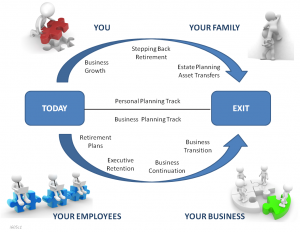Financial planning for business owners is more complex only because independent business owners must confront a myriad of tax laws and regulations while trying to effectively create products or services, manage their employees, develop and cultivate clients, and do so profitably. It can be challenging, to say the least.
 Quite often, owners are so absorbed in day-to-day operations and profitability issues that there’s little time tend to their own financial needs; and this also means they can easily overlook key planning considerations that could help their business grow and prosper. If that isn’t enough, the owner’s very business survival can be imperiled when unexpected events occur, even outside the owner’s control, that adversely affect the bottom line of the business.
Quite often, owners are so absorbed in day-to-day operations and profitability issues that there’s little time tend to their own financial needs; and this also means they can easily overlook key planning considerations that could help their business grow and prosper. If that isn’t enough, the owner’s very business survival can be imperiled when unexpected events occur, even outside the owner’s control, that adversely affect the bottom line of the business.
Business Owner Needs
Retirement
For many business owners, the business is their primary retirement asset; and after many years of building a successful business they expect to convert it to an income for retirement by selling it. When you think about it, they’re staking their entire future on the price of a single stock! But, what if the value they need to produce the income they desire isn’t there when the time comes? Bad timing (Murphy’s Law) can happen due to circumstances beyond the owner’s control when it’s least expected… remember the melt-down?
Businesses can fail, of course. Economic cycles play a role, as well. The timing is not always right to sell a business. And, business owners who are highly ‘hands-on’ may have additional problems: A potential buyer may be wary of an investment when the true value of the business lies in the talents and good will of the business owner who won’t be around to run the business after he retires.
The takeaway: Business owners today must prepare for retirement with the same level of diversification recommended for any retirement plan. Business owners have access to a number of qualified and non-qualified retirement plan options that can provide a cornerstone for their retirement income needs. In other words, it might be smart to use the business as a cash-flow generator in order to build net worth outside the business itself. If you can sell later, great; but, if something goes wrong, you still have a cash-flow generator.
Business Valuation
Before you can realize your rewards fully, you’ll have to quantify what you’ve accomplished. Only then will you be able to explore your options, choose your path, and make the moves that matter.
Business owners make decisions every day – indeed, many have their entire net worth invested in the decisions they make – yet, few know, in advance, just how those decisions will impact business value. According to the Small Business Administration, insufficient knowledge about business value is one of the top two challenges facing small business owners and leaders. That’s because companies that DO understand their worth are better positioned to pursue growth initiatives, attract and reward talent, and ensure proper credit and risk management.

IFG is able to help, as part of our financial planning process, through the use of an innovative, patented online business valuator system that provides IFG clients with access to real-time business valuation knowledge. This resource represents the “on-ramp” to almost everything you need to do to accomplish a variety of objectives. It helps business owners answer the most important question they face before engaging in any financial decision-making conversation: What’s my business worth?
It’s about insight: Knowing where you stand and where you may be headed.
There are seven simple steps in the process; and the system continually updates your valuation as you go through the steps. The result: A customized 24-page Business Valuation Report. And, you’ll have access to the online system for ongoing strategic decision making for a full year.
Business Succession
When a business partner dies, the business loses a valuable asset and could suffer in the short term. The long term issue for surviving business owners is whether the business can survive when the partner’s family members show up for their interest in the business.
 For the families of business partners, the business interest is often their biggest asset and they become the rightful owner of that interest at the death of the partner. They will want to receive their share of the business, either in direct compensation or through their participation as an active partner in the business. Quite often, the surviving partner would rather not have the heirs of the deceased partner as new business partners. That can lead to problems, as you might suspect.
For the families of business partners, the business interest is often their biggest asset and they become the rightful owner of that interest at the death of the partner. They will want to receive their share of the business, either in direct compensation or through their participation as an active partner in the business. Quite often, the surviving partner would rather not have the heirs of the deceased partner as new business partners. That can lead to problems, as you might suspect.
But if the surviving partner doesn’t have the capital to compensate the heirs for their share of the business, options are limited and not very attractive. A business succession plan can provide for the orderly transfer of the business interest from the deceased’s family to the business.
Key Employee Protection
 One of the more devastating events a small business can suffer is the loss of a key employee. Often times it’s a key employee who brings a special talent to the business and is responsible for much of the success of the business owner. The loss of such a valuable asset could set the business back for a period of time, and at tremendous cost, while the business owner seeks to find a replacement, if one can be found at all.
One of the more devastating events a small business can suffer is the loss of a key employee. Often times it’s a key employee who brings a special talent to the business and is responsible for much of the success of the business owner. The loss of such a valuable asset could set the business back for a period of time, and at tremendous cost, while the business owner seeks to find a replacement, if one can be found at all.
Most of us know that our most valuable assets – our home, our ability to earn income, our cars – should be insured against an unexpected loss. It’s no different for business owners as the loss of a valuable business asset could imperil the business.
Buying life insurance coverage on a key employee makes good business sense. The amount of coverage should be enough to cover the costs of recruiting and paying a replacement, loss of earnings to the company to get through the adjustment period, and any redemption of stock or a salary continuation plan arrangement with the surviving family.
Executive Compensation
Finding good talent isn’t easy; it probably won’t happen overnight. In fact, it could take years to find or develop the executive talent needed to build the business to the next level. Executive talent is hard to come by, and it is even more difficult on the business when it walks out the door in pursuit of another opportunity.
 When key executives are presented with a strong monetary incentive package, they are more likely to stay and utilize their talents where they feel appreciated and appropriately rewarded. Structured incentive plans can help keep key executives in place and motivate them to higher levels of performance.
When key executives are presented with a strong monetary incentive package, they are more likely to stay and utilize their talents where they feel appreciated and appropriately rewarded. Structured incentive plans can help keep key executives in place and motivate them to higher levels of performance.
Plans such as Non-qualified Deferred Compensation, Executive Bonus, and Split Dollar Life Insurance are life insurance based plans that enable the business to offer current and future benefits to their key executives in exchange for their continued service for a specified period of time.
Here’s IFG’s complete menu of business services.
For more information on Business Owner Planning, please contact us today.




